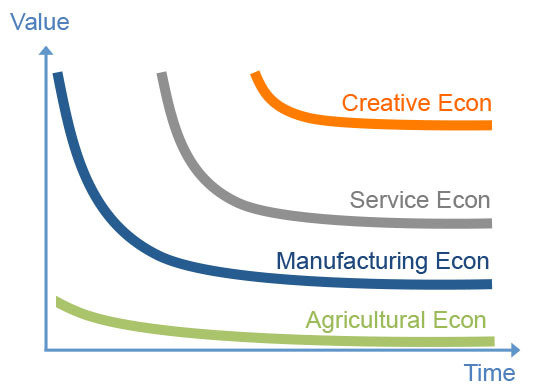Designers have a tremendous impact on social, political and economic development since they turn business ideas into products or services. With the Creative Economy now the prime driver of progress - how might creative professionals contribute to a new more sustainable paradigm in the area of economics?
Our Capitalistic Economy is characterized by the means of value creation and capturing being primarily privately owned and operated for profit. Key pillars of the Capitalistic Economy are: private property, capital accumulation and wage - labor relationships. Exchange of goods is primarily organized in a competitive market and the stakeholders usually negotiate the split of the value created resulting from the exchange.
Capitalism has fueled progress for centuries, however the concept of the Capitalistic Economy is founded on the assumption that people act rationally, which Behavioral Economics has long ago disproven. Could empathetic design, help Capitalism to address real human needs more effectively?
The foundation of any economic system is what its participants perceive as fair. From there, it moves on to optimizing effectiveness as well as efficiency. Has our sense of fairness changed and, if so, how will it influence a redesign of Capitalism?
To explore the redesign of Capitalism, we invited creative professionals to share their thoughts and ideas below on the challenges, drivers and opportunities that a redesign might offer.
The main challenge of redesigning Capitalism is the momentum of our current Capitalistic Economy. Since it has existed for generations, few in the Western World seem able to remember, or even to be able to imagine other ways of organizing an economy.
There was a general sense among creative that Capitalism could not continue to work as it is and that current checks and balances fail to prevent powerful stakeholders from gaming the system and undermining the foundation of our economy. Examples offered were:
- Preventing freedom in the marketplace
- Corruption, enabling rent extraction
- Promoting a society based on a pervasive pyramid scheme
- Perverse incentive systems fostering an "us" against "them" and "win - lose" attitude
There was a consensus among creatives that our current system was broken. However, there was also a general apathy towards the creative redesign of Capitalism because of the perception that only those in power could change the system.
A minority thought that it was everyone's responsibility to participate in re-defining Capitalism and that it would take a grass roots movement to make it happen. A system that primarily applied a "bottom up" approach was seen as superior to one that applies a "top down" approach and that just happens to be the fundamental idea behind crowdsourcing.
With the tremendous changes technology has undergone during the past decades, leveraging new innovations, such as Big Data Analytics, social networks, new social media, crowdsourcing and crowdfunding was suggested as a way to redefine how business is conducted with an eye toward a more fair distribution of profit.
Optimism moderated by a sense of reality, combined with transparency and communication along with personal freedom and the liberty to take action was seen as a good place to start. Designers working within governments to create new models, as they currently do within industry, were also deemed as essential to the endeavor.
The design process was thought to be a good approach toward re-designing capitalism and that "good design" could be instrumental in creating compelling visions, providing the necessary inspiration to propel change.
It was suggested that the Capitalist Economy needed to include aspects such as social/human and environmental, perhaps, also widely adopting such elements as happiness and well being in order to measure true progress. To achieve this, a hybrid of Capitalism and Socialism was suggested, which is the model one sees already in Scandinavian countries.
The economic challenges that we face today may have become so complex that we are unable to solve them without a reboot and the development of a completely new paradigm. If we are unwilling to utilize our innate flexibility and cooperation, we may yet see a repeat of ancient (the Roman Empire) and not so ancient (the USSR) history and there are no guarantees such a meltdown could not happen here as well.
